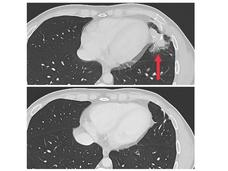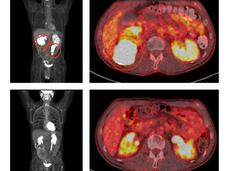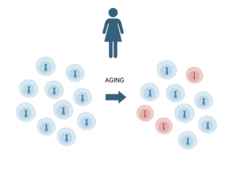NIH clinical trial will test precision medicine treatments for myeloid cancers

NCI has launched myeloMATCH, a precision medicine treatment trial that will test treatment combinations targeting specific genetic changes in people with acute myeloid leukemia and myelodysplastic syndromes.
New cancer diagnoses did not rebound as expected following pandemic

While new cancer diagnoses largely returned to pre-pandemic levels in 2021, they don’t account for the missed diagnoses in early 2020 that resulted from disruptions in cancer screening and other medical care.
New cancer diagnoses did not rebound as expected following pandemic

While new cancer diagnoses largely returned to pre-pandemic levels in 2021, they don’t account for the missed diagnoses in early 2020 that resulted from disruptions in cancer screening and other medical care.
Immunotherapy after surgery helps people with high-risk bladder cancer live cancer-free longer

An NCI trial shows that giving patients pembrolizumab after surgery for high-risk muscle invasive bladder cancer doubles the median length of time that they remain cancer free, compared with observation alone after surgery.
NIH study links neighborhood environment to prostate cancer risk in men with West African genetic ancestry

A new study suggests, for men with West African genetic ancestry, living in a disadvantaged neighborhood was associated with a higher risk of prostate cancer. The researchers posit that chronic stress—such as from racial profiling, housing discrimination, and exposure to violence—may be a possible driver.
Immunotherapy approach shows potential in some people with metastatic solid tumors

A new cellular immunotherapy approach shrank tumors in 3 of 7 patients with metastatic colon cancer, in a small NCI clinical trial. Normal white blood cells from each patient were genetically engineered to produce receptors that recognize and attack their specific cancer cells.
For healthy adults, taking multivitamins daily is not associated with a lower risk of death

A large analysis of data from nearly 400,000 healthy U.S. adults followed for more than 20 years has found no association between regular multivitamin use and lower risk of death.
Combination targeted treatment produces lasting remissions in people with resistant aggressive B-cell lymphoma

More than half of clinical trial participants treated with venetoclax, ibrutinib, prednisone, obinutuzumab, and lenalidomide (ViPOR) had substantial tumor shrinkage. Of those, 38% had tumors that disappeared completely.
Inherited genetic factors may predict the pattern of X chromosome loss in older women

An NCI study explores the causes and effects of a phenomenon known as mosaic loss of chromosome X, or mLOX, which may lead to several health conditions, including cancer.
NIH scientists develop AI tool to predict how cancer patients will respond to immunotherapy

AI tool developed by NCI researchers uses routine clinical data, such as that from a simple blood test, to predict whether someone’s cancer will respond to immune checkpoint inhibitors, a type of immunotherapy.
